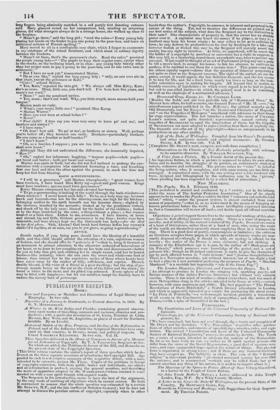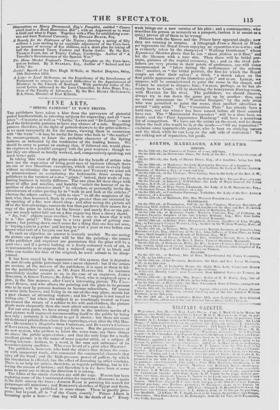PUBLICATIONS RECEIVED.
Books.
Law and Lawyers; or Sketches and illustrations of Legal History and Biography. In two vols.
Narrative of a Journey to Guatemala, in Central America, in 1838. By G. N. MONTGOMERY.
A Winter in the It Indies and Florida; containing general observa- tions upon modes of travelling, manners and customs, climates and pro- ductions ; with a particular description of St. Croix, Trinidad de Cuba, Havana, Kee West, and St. Augustine, as places of resort for Northern invalids. By an Invalid.
Historical Sketch of the. Rise, Progress, and Decline of the Rejlermatiem to Poland, and of the Influence which the Scriptural Doctrines have exer- cised on that country, in literary, moral, and political respects. By Count VALERIAN KRASINSKI. In two vols. Vol. IL Ile er .,,jeeeches delivered in the Meuse of Commons in favour if a ..lkasure jeer 'en Extension e■I Copyright. By T. A. TAr.rou lin, Sergeant-at-law. To which arc added, the Petitions in favour of the Bill, and Remarks on the present state of the Copyright Question. [This little volume contains the orator's report of three speeches which he de- livered on the three ,eparate occasions of introducing his Copyright Bill. Ap- pended to each is a descriptive summers, of the respective debate, with a note, intended to be sarcastic, against Mr. Copies of the petitions in favour of copyright-extension, both from public bodies rind individuals, are added; and an introduction is prefixed, arguing the general question, and describing the mode of opposition adopted by Alf. WARBERTON—whose conduct is coin- mented on with a sore spirit though with sugared words. The Sergeant, in his introduction, seems to have the best of the argument, by the easy mode of omitting all objections which he cannot answer. He finds it convenient to assume that the whole question was exhausted by a certain Mr. STRUTT, M.P., and the late inefficient Solicitor-General ; but he does not attempt to discuss the peculiar nature of copyright, especially when in other bands than the author's. Copyright, he assumes, is inherent and perpetual hies nature of the thing. Yet, not to mention the differences we pointed out is our first notice of the subject, what does the Sergeant say to the distinction's their uses ? One characteristic of property is, that the owner has an obsolete power over it. A capitalist may hoard his money if he pleases, or bury it; a landlord may keep his house empty ; he may refuse to let or to cultivate Ma farm; he may destroy its productiveness for ever by flooding it for a lake ; and, however foolish or wicked this may he, the Sergeant will scarcely assert that society has any right to interfere. As little, we apprehend, will he assert that the holder of a copyright by purchase or succession has a right to suppress it, His very bill, in a lumbering, roundabout, unworkable way, tries to prevent sup. pressing. What would be thought of an act of Parliament giving any one a power to till a man's land, to occupy his house, to fish his streams, to cultivate his gardens, if he omitted to use them for a certain time? This point—and there are others equally cogent—shows that the question of inherent perpetuity it not quite so clear as the Sergeant assumes. The right of the author, no one dis- putes, except, it would appear, the late Solicitor-General; and the law secures it to him for life, and for a fixed term, nearly ten times as long as the hook- seller calculates upon in making his bargain. All beyond this is matter, we
i humbly conceive, of legislation ; in which every regard is to be had to justice, but not to one-sided justice—in which the general weal is to be considered, as well as the claptraps of a sentimental advocacy.]
Rosamund Gray, Essays, c. By CHARLES LAMB. Besides the feeble and not very probable tale of " Rosamund Grey," Mr. Moxos here offers, for half-a-crown, the dimmed Farce of " Mr. IL —;" the miscellaneous papers published in the /?ffiector; the critical remarks on the Old Dramatists, and the Essays " on the Genius and Character of Bogarthp and " on the Tragedies of Shakspere" considered with reference to their fitnessfor stage representation. The last broaches a notion, like many of CHARLES Lassn's notions, not quite founded : representation cannot embody the tragedies of SIIAKSPERE to equal the imagination of them, but the tragedies of SIIAKSPERE are more adapted to representation than those of anybody else. The dramatic art—the art of the playwright—shines as conspicuously in hit productions as any other quality.] Life of the Duke of Wellington. Compiled from his Grace's Despatcher, anti other authentic records and original documents. By GEMS SOANE, A.B. In two vols. Vol. II.
[Completes. Mr. SOANE'S neat, compact, and well-done compilation.] Observations on the Climate of .Sige Zealand; principally with reference to its sanative character. 13y WILLIAM SWAINSON, Esq.
A Voice front a Picture. By a Female Artist of the present tiny. [An ingenious fiction, in which a picture is supposed to relate its own mina- tures, and to describe the struggles of its painter, an enthusiastic student of nature, unknown acid mffriended. The picture raises its "voice" in behalf of the living artists ; who, it complains, and with some reason, arc too little ea. courageiL A sequestered scene, with the sun setting over a lake bordered with trees, designed and lithographed by the authoress, may be the "picture," whose pleading has been responded to by a select list of subscribers.] NEW MAGAZINE.
The Psyche. No. I. February 1840. [This periodical is started and conducted by a " soviets-, yet in its infancy, under the name of The Author Protector Association:1' One of its objects appears to he to render the Psyche vehicle for that " unknown and unbefriended talent," which, " under the present system, is almost excluded from every means of popularity,"—that is, as we understand it, the means of bringing un- known productions before the world. A more intelligibly-expressed intention is, that a Committee will review all books, and decide upon all offered contrilm-
•
priori suggest themselves to the successful working of this plan tioonsb. Objections nor does its first offering promise very greatly. There is a want of purpose, of novelty, and of utility, in the current number of the Psyche. Its contents smack of a knot of littiwateurs, rather than of a hand of men, who, seeing the wants of the world, set themselves earnestly about supplying them in a business-like way. There is a good deal of poetry, commonplace or imitative ; the criticism on literature occupies three pages, in whirls upwards of twenty works are sum- warily disposed 4— though, it should be sold, an apology is offered tar the brevity ; the notice of the Drama is more elaborate, but not striking. A romance of the Elizabethan age is begun, by the author of" Shakspeare and his Friends," which possesses some knowledge of the period, and a sort of galvanic life ; though an ill-judged endeavour is made to give the character of age by such affected terms as " right delicate" and "famous thoughtfulness." There is a Norwegian anecdote, not without interest, but of too slight a kind to find a place in it new periodical professing the purposes of Psyche. Miselton Mordant " is a readable but improbable " talc of the Great Foe] The London Magazine, Charirari, and Courriers des Dames. No. I. [An attempt tee produce in London the stinging wit, sparkling gayety, and foreign manner of the lighter Parisian literature; but without very eminent success. There is too much of wordiness almost everywhere, and too much of mere Metropolitan slang in the articles intended to be funny or wittv,—mixed, however, with some smartness and ability. The hest papers arc " The Diurnal Revolutions of Davie Dithlledoft," a !..:cotell literary adventurer in London, and which is apparently intended as a vehicle for portraying life about town; " La Pieta di Puleinella,"—a well-wrought incident, probably a translation, at all events in the Continental style of composition ; and thee notice of the Drama,—with a spice of favourition in the last.]
PAM PIII.ETS.
The Constitution and Laws eg. the Universal Community if Rational Re- ligionists.
Proceedings, t c. qf the Universal Community Society of Rational Reli• gionists, &c.
[We have examined, but have not crud ihmugh, these tracts and pamphlets of Mr. OWEN and his Socialists. " The Proceedin,,s " resembles other publica- tions of other societies, and consists of speechify fogs, minutes, rules. and rega- lotions. The revised " Constitution and Laws of the Universal community Society of Rational Religionists," conveys its nature by its title. The Tenets are a series of essays, intended to advocate the notions of the Nationalists. So Mr as we have read, we Can See rather an ill spirit against; persons whO differ from the views of the Social llc:.elierators, a good deal of Sp13:1011, 111)11. sense, and some exaggerated. hopes against the nature of things. lint physical force is repudiated III strong terms ; Had if there ire any iminoral doctrines, they have escaped us. The Infidelity is clear. The 8,1111 Of the " Rational religion" is this—that probably " an eternal uncaused essence has ever tilled the universe, and is onniipremnt"—which may be called God ; but as we cannot ascertain any thing of his nature, it is useless to inquire about it.]
The Marriage eg" the Queen to Prince Albert of Saxe Cobuty, Considered, in a Letter to the People of Cleat Britain.
Sir John Filmic Buller's Median ; a Letter addressed to John Temple Leader, Esq., M P. By a Whig Comity Member. A Letter to leis Grace the Duhelf Wellington, on the present State of the Country. By MONTAGUE GORE, Esq. Remarks on Currency and Ranking; with Suggestions for their Improve- ment. By THOMAS Num°. Observations on Henry .Drummond, Esq.'s Pamphlet, entitled " Causes which lead to a Bent Restriction Bill"; with an Argument as to what is Gold and what is Paper. Together with a Plan for establishing a cer- tain and fixed National Currency. By DONALD BLACK, Esq.
A Remedy fin' the Distresses of the Nation; showing a saving of fifty millions a year sterling by an equitable adjustment of the Corn-laws, an increase of revenue of five millions, and a short plan for taking off half the Assessed Taxes, Custom and Excise duties. By the Rev. THOMAS FARR, late of Trinity College, Cambridge. Author of " A Traveller's Reminiscences of the Spanish War."
The Home Market England's Treasure : Thoughts on the Corn-laws, and on Ireland. By J. STANLEY, Esq., Author of " Ireland and her Evils," &c.
Jezebel: Speech of the Rev. Hugh M'Neile, at Market Drayton, Salop, 19th December 1839.
Letter to Lord Melbourne, on the Expediency of the Interference of Parliament to remove the present Difficulties in the Appointment of Ministers in the Church of Scotland. With particular notice of the recent Letter addressed to the Lord Chancellor, by John Hope, Esq., Dean of the Faculty of Advocates. By the Rev. HENRY MoNcatErr, B.A. Oxon, Minister of East Kilbridc.



























 Previous page
Previous page